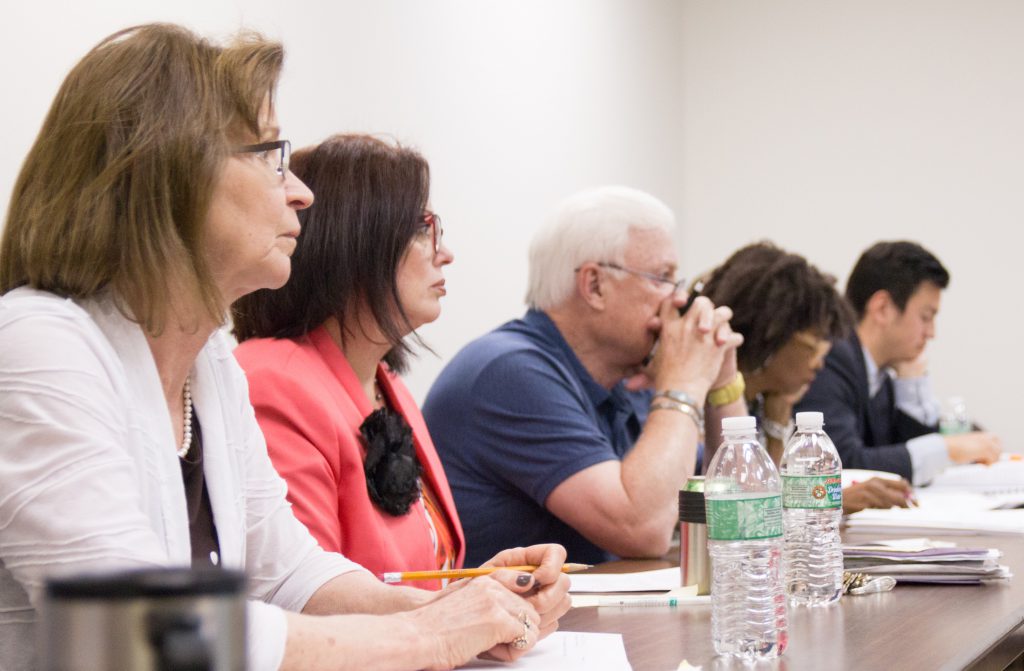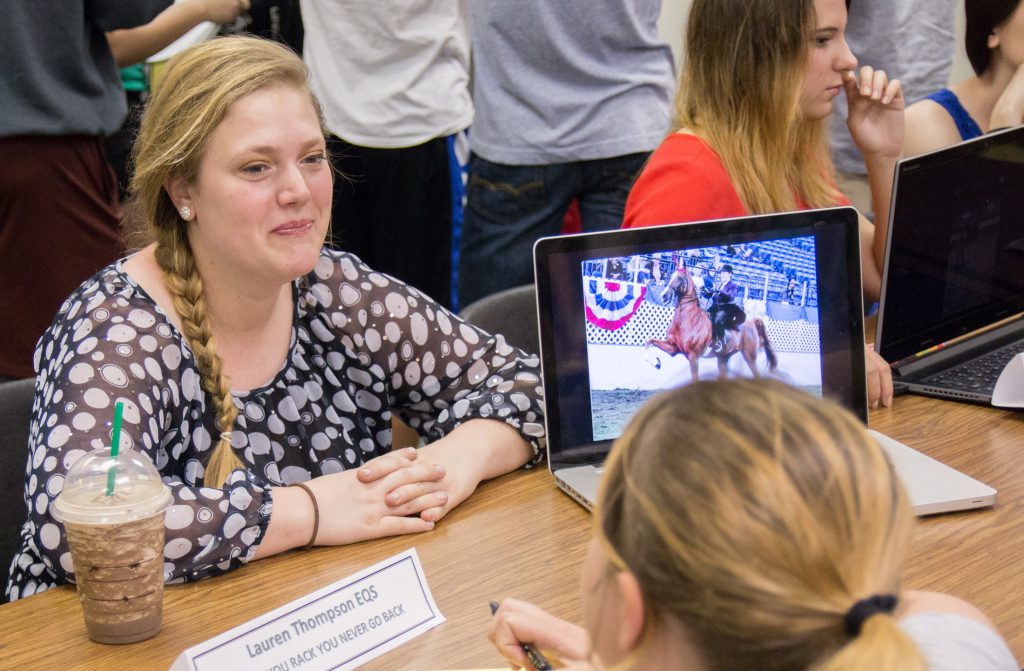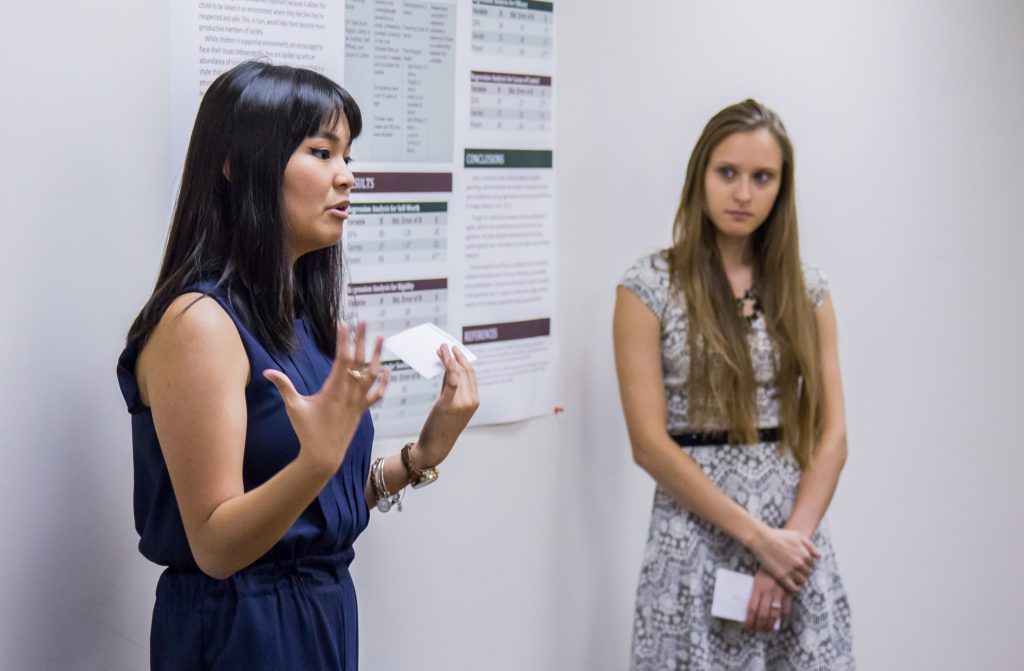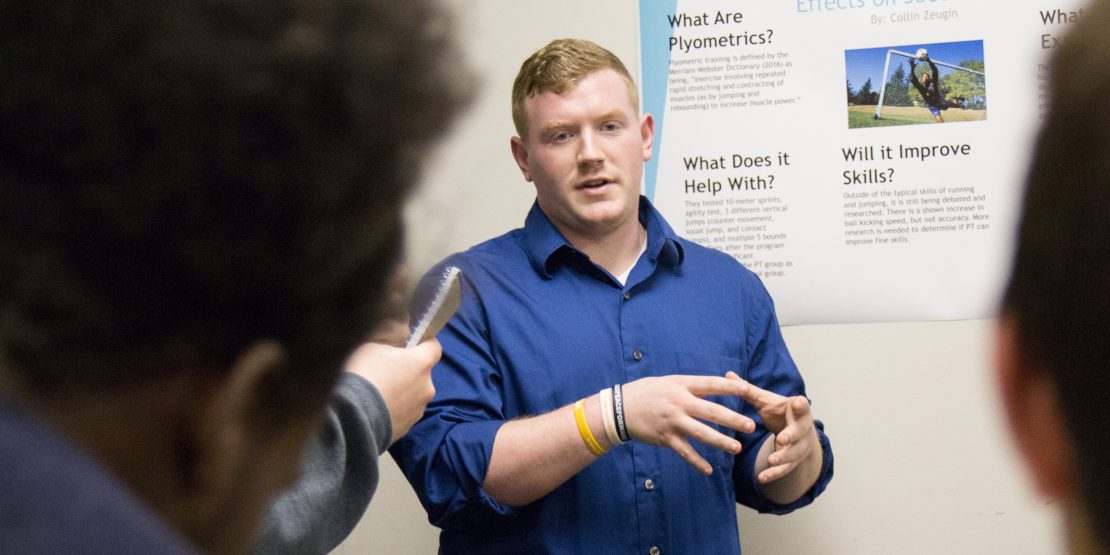Nothing sounds better to a college student than two days of cancelled classes. But at William Woods University, those two days are an important part of the semester. They’re Performance Review Days, which are sometimes called assessment days.
For two days in the spring semester, the university cancels classes for two days so that departments across campus can take a moment to evaluate how their students are doing. This year, Performance Review Days will be held February 20 and 21st. The days include presentations, projects, interviews, and more.
Every student in every major is involved in some type of activity. They are assessed by panels of faculty members in their majors and sometimes outside industry experts. The process started about five years ago and is a great way to check in on student progress and even consider changes to academic programs.
“We are looking at the bigger picture of program assessment,” says Dr. Carrie McCray, associate professor of ASL Interpreting and associate dean of academic assessment. “Are students learning what they need to learn to be successful when they graduate?”
“I love assessment days,” says Mya Moyer, an English major from Fond Du Lac, Wisconsin. “And not just because it’s a break from regular classes. We get a chance to converse with our peers and with our professors outside of the normal context. I think it helps increase the cohesion of the department overall.”
Here are a few examples of what Performance Days look like for some of the William Woods departments:
American Sign Language and Interpretation
The ASL department has a three-part assessment, where students are evaluated on their production skills. They are asked to complete a list of language tasks, demonstrate comprehension skills which are evaluated through watching a video, and answering questions regarding its contents, and expressing knowledge of Deaf Culture through a written exam.
As ASL and Interpreting instructor, Becky Davis, states: “Our program is considering making a national assessment program part of our annual review days, so that we can see where our students fall in comparison to national standards to better assist our students in the program here at WWU or for graduate school.”
One of the largest improvements the ASL department has made is the incorporation of an upper-level English course. The professors were notified that their students were not scoring high on the written English proficiency portion of the mock certification test given during Review Days. So, they adjusted the curriculum to add more linguistic skills and better prepare their majors.
Biology
The Biology department is very busy over the course of these two days. When Biology majors enter The Woods, they take an overarching test that measures their knowledge of different areas of Biology (cell biology, genetics, ecology, etc.). It’s not a test you study for—it’s meant as a marker of what you know already. Then, during Performance Days, senior Biology majors take that same test to see how far they’ve come during four years of study. Their scores are compared to their freshman year scores and the national scores as well.
Sophomores and juniors in the Biology program have a different process. They go through an oral exam, where students pick two Biology-related questions from a list and then have to discuss them in front of a panel of science professors.
During the Performance Day period, the Biology department also offers career counseling sessions to discuss what students can do with their degree, types of internships they should apply for, etc. They also invite an outside speaker to share their research with the students. Last year, the speaker was Megan Sheridan, who discussed her research on vulnerability of primitive human placental trophoblast and the Zika virus.
“Student Performance Review Days give the Biology faculty a snapshot of how the students are doing and how they’re progressing in the program,” says assistant professor of biology, Dr. Kimberly Keller.
Business

The Business department’s assessment days are also about testing. On the first day, all majors take tests. Freshmen take the National Peregrine test, a national assessment that helps the faculty know how much knowledge they have as they begin their education. Sophomores and juniors take an internally generated test that shows the difference in the information the sophomores and juniors have retained. Finally, seniors take the National Peregrine test again to show how the program adds value to their education.
On the second day, the Marketing Research class presents feedback from a survey that last year’s class students collected from the previous Student Performance Review Days. In 2017, the Marketing Research class handed out another student-generated survey, which will be used this year. Finally, there are also discussions with professionals from different business backgrounds to give insight and feedback on the value the students are getting from the program, skills they are developing, and if there is anything the faculty needs to start implementing in their program to stay up to date with the business world.
“Our theme during Performance Review Days is figuring out how the Business department is going to continuously improve,” says assistant professor of business, Brenda Popp. “We think we are a strong, solid program, but we are not ever going to be satisfied. We want to continuously improve and adapt to the professional world because it is always changing.” The faculty continuously asks for program feedback from business professionals, alumni, and students. For example, the outside evaluators, alumni, and students recently commented that the program needed additional technology instruction, so they added a course called Advanced Productivity Tools. This type of feedback has led to many program improvements, such as creating the individual study lab and Think Tank, so that students would have places to study and work on group projects.
Communications
After declaring a Communications major, the student will watch all other students present their portfolio to the Communications department faculty and outside evaluators. Every year after that, the student will be expected to present. They need to incorporate an elevator pitch as well as a brief description of the three to five artifacts they have chosen to put in their portfolio. The second day, all students read an article and answer questions about it to evaluate their understanding and ability to analyze articles. The same process occurs with a picture of an advertisement.
“By presenting their work to industry professionals, the students and the program are able to receive practical feedback that can be used to strengthen their professional portfolios, which allows the faculty to strengthen the Communications program,” Communications instructor, Anthony Weed, stated.
“The biggest thing we have to prepare for at William Woods are portfolio reviews,” says Chandler Bramstedt, a Communications senior from Columbia, MO. “Every year we compile examples of our best work as Communications majors and form them into a professional-styled presentation. This can be a great learning experience. The first few times you present won’t be good, but you’ll soon learn to make your final presentation great.”
Equestrian Sciences

Performance Days vary widely for equestrian students. Freshmen receive extensive help with deciding their major; sophomore Equestrian Science, Equestrian Administration, and Equestrian General Studies students take varying proficiency exams, which consist of a written exam and interview. EQS students have an additional portion, as they have an applied riding test.
The juniors and seniors have portfolio preparation workshops, where the students choose pieces of coursework and experiences from the program to be scored by the faculty.
“We have modeled the sequence after what the industry demands of our graduates,” shares Jennifer Petterson, an associate professor and chair of the Equestrian Studies division. “The sophomore test is an indicator of the student’s readiness to move forward with their skills and progress through the major they have selected.”
The Equestrian department created an entirely new major because of these review days. The professors noticed that not all of their students wanted to train horses or manage a barn, so the Equestrian General Studies major was added, with varying concentrations that include leadership, communication, and digital media. It helped them prepare students for their future careers.
Social Work

On the first day, senior students lead freshman, sophomore, and junior classes in the process of four different, fictitious family cases, with the goal to create a genogram, ecomap, and treatment plan for each family. The second day is composed of an ACAT exam for seniors and professional development for all social work students. Juniors must also apply to the Social Work program specific to William Woods, which involves writing a paper, collecting three references, getting a background check, presenting a resume, and being interviewed by three to four faculty from the department.
“Each year we spend a great deal of time going over our national accreditation standards, reviewing our program handbook, field education manual, national competencies, and practice behaviors that are required for social work majors,” says Dr. Elizabeth Wilson, a Social Work professor. “Overall, student Performance Days are an asset to our university and demonstrate the university’s commitment to assessment and continued program improvement.”
“It can be hectic if you wait until the last minute, but I think it’s exciting! You’re one step closer to your degree!” says Ashley Powell-Brooks, a junior and Social Work major from St. Louis.
Although these days are to promote growth and change within the varying departments on campus, students feel they get a great experience out of it as well.
“I believe Performance Review Days benefits the programs because it gives us the feedback about how well we are performing compared to other college students. I feel it gives me an idea of where I am and shows my hard work is paying off,” Preston Wolfe, a pre-med major from Ashland, MO, says.

